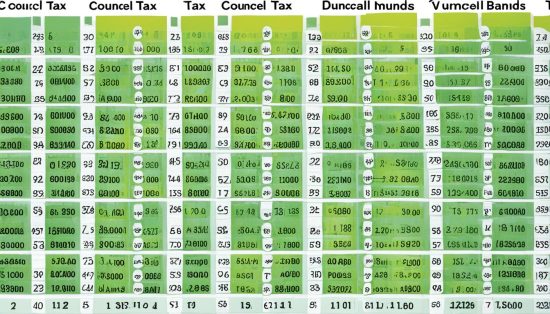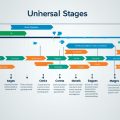Are you curious about Council Tax Band H? Wondering how your property’s valuation affects the amount you’ll be paying in council tax? Look no further! In this article, we will provide you with a complete guide to Council Tax Band H, including an explanation of council tax bands, how they are determined, and what it means for owners of expensive properties in terms of council tax. Whether you’re a homeowner or a renter, understanding these concepts can help you make informed decisions regarding your financial responsibilities. So, let’s dive in and explore the world of council tax valuations in the UK!
Understanding Council Tax Bands
In the United Kingdom, council tax is a local property tax that is used to fund essential public services in your local area. The amount of council tax you pay is determined by the valuation band your property falls into, which is based on the estimated value of your home as of 1 April 1991 in England or 1 April 2003 in Wales.
Council Tax Bands in England
Properties in England are assigned to one of eight council tax bands, ranging from Band A (up to £40,000) to Band H (more than £320,000). The specific band ranges are as follows:
- Band A: Up to £40,000
- Band B: £40,001 to £52,000
- Band C: £52,001 to £68,000
- Band D: £68,001 to £88,000
- Band E: £88,001 to £120,000
- Band F: £120,001 to £160,000
- Band G: £160,001 to £320,000
- Band H: More than £320,000
Council Tax Bands in Wales
In Wales, properties are assigned to one of nine council tax bands, ranging from Band A (up to £44,000) to Band I (more than £424,000). The specific band ranges are as follows:
- Band A: Up to £44,000
- Band B: £44,001 to £65,000
- Band C: £65,001 to £91,000
- Band D: £91,001 to £123,000
- Band E: £123,001 to £162,000
- Band F: £162,001 to £223,000
- Band G: £223,001 to £324,000
- Band H: £324,001 to £424,000
- Band I: More than £424,000
Understanding the council tax banding system is crucial for homeowners and residents, as it directly affects the amount of council tax they pay each year. By knowing which band your property falls into, you can better plan and budget for your council tax payments.

Properties in Council Tax Band H
Council Tax Band H is reserved for the most valuable domestic properties in the UK, with a valuation of more than £320,000 in England or more than £424,000 in Wales as of the relevant valuation dates. These properties are typically large, high-end homes, such as mansions, castles, or stately homes.
Valuation Criteria for Band H
The Valuation Office Agency (VOA) determines the council tax band for a property based on a range of factors, including its size, layout, character, location, and value as of the relevant valuation date. In England, the valuation date is 1 April 1991, while in Wales, it is 1 April 2003.
The VOA may visit properties to assess their council tax band, considering various elements like the number of rooms, the quality of fittings and fixtures, and the property’s overall condition and desirability. Properties that undergo significant renovations or have additions like annexes may also be re-evaluated for a potential change in their council tax band.
| Council Tax Band | Property Valuation (England) | Property Valuation (Wales) |
|---|---|---|
| Band H | More than £320,000 (as of 1 April 1991) | £324,001 to £424,000 (as of 1 April 2003) |
It’s important to note that council tax band assessments are based on the property’s value at the relevant valuation date, not its current market value. While later property improvements, such as extensions, do not immediately impact the banding, they could lead to a re-banding upon sale.

Council Tax Band H
Council tax band H is the highest tax bracket in the United Kingdom, signifying the most valuable and expensive properties. Owners of these premium properties can expect to pay significantly more in council tax compared to lower bands. The exact amount payable for a band H property will depend on the local council’s tax rates, but it is generally substantially higher than the rates for more modestly priced homes.
In the 2021-22 financial year, the standard council tax for a band H property was £3,374.39, with additional charges of £424.98 for water supply and £493.38 for waste water collection, totalling £4,292.75 to be paid. This marked a considerable increase from the previous year’s £3,374.39 council tax charge for band H.
The introduction of legislation in April 2017 saw a 22.5% increase in the council tax charges for band H, rising from £2,460.78 to £3,014.46. This upward trend in council tax rates across all bands has continued, with the charges for band H properties growing steadily each year, in line with the rising costs of water supply and waste water collection.
| Council Tax Band | Property Value (As of 1 April 1991) | Council Tax (2024-25 Financial Year) |
|---|---|---|
| Band H | More than £320,000 | £4,214.70 |
The council tax amount for band H properties in the financial year 2024-25 is £4,214.70, reflecting an overall 4.9% increase in council tax charges across all bands. It’s important to note that the actual council tax payable can vary based on individual circumstances, including entitlement to discounts, disabled relief, exemptions, or reductions based on income levels.

Property owners who believe their property has been incorrectly assigned to council tax band H can challenge the banding by contacting the Valuation Office Agency. This process allows homeowners to ensure they are paying the appropriate amount of council tax based on the true value of their property.
Challenging Your Council Tax Band
If you believe your property has been placed in the wrong council tax band, you may be able to challenge the banding. There are valid reasons to challenge your council tax band, such as changes to the property since the original valuation, errors in the Valuation Office Agency’s (VOA) assessment, or if the valuation is wrong due to a legal decision on a similar property. The VOA will review the banding and make a determination on whether it should be changed.
Reasons to Challenge Your Banding
Properties paying council tax for less than six months can initiate a formal challenge. Challenges submitted as proposals are legally required to be reviewed. Formal proposals can be made when a property has been demolished, altered, or when local area changes occur. For cases where council tax has been paid for over six months, band reviews are available as informal challenges. Supporting evidence is crucial for successful challenges.
Process for Challenging Your Banding
- Check the banding of similar properties in your area to see if yours is in line with the local market.
- Contact the VOA and request a review of your property’s valuation. Up to five comparable properties can be used as evidence for banding challenges.
- If the VOA rejects your challenge, you can appeal the decision to the local valuation tribunal. Evidence from house prices between specific periods in England and Wales can be utilized.
It’s important to note that a successful challenge could result in your property being placed in a higher band, leading to a higher council tax bill. Typically, decisions on challenges are communicated within a few days, but a waiting period of up to four months can be expected for a final decision. Possible outcomes of challenges include band increase, decrease, or remaining the same. Neighbouring properties may receive band reviews based on challenge outcomes.
Appeals can be made to the Valuation Tribunal if one disagrees with a proposal decision. Taxpayer confidentiality laws prohibit the sharing of property information used in decision-making. Consultations about individual cases should be directed through the appropriate contact form.

Council tax bands are based on property values as at 1st April 1991. The VOA may refer to the tone of the list where a number of similar properties have bandings which have not been challenged or changed over time. Selling prices of similar properties sold on or near 1 April 1991 can be used as evidence. Information on the bandings of other similar properties in the area can be accessed through sources like local estate agents and government websites.
Over 11,000 households won their cases challenging their council tax band in the 2020-21 tax year. Repayments for successfully challenging an incorrect council tax band can be backdated to 1993, resulting in potentially receiving four figures or more. The Valuation Office Agency (VOA) in England can be reached at 03000 501 501 for assistance with challenging council tax bands.
Discounts and Exemptions
The council tax system in the United Kingdom offers a range of discounts and exemptions that can significantly reduce or even eliminate your council tax bill. Understanding these provisions is crucial to ensuring you pay the right amount of council tax.
Council Tax Discounts
Discounts are available in certain circumstances, such as for single-person households or for properties occupied by individuals with severe mental impairments. Council tax discounts can also be applied to second homes, empty properties, and properties undergoing major repair work or structural changes.
- Single-person households are eligible for a 25% discount on their council tax bill.
- Residents with severe mental impairments may qualify for a council tax discount, as their property is considered a ‘disregarded dwelling’.
- Councils can provide discounts on council tax for second homes and empty properties, with the amount of discount being at their discretion.
- Discounts may be applicable during major repair work or structural changes to a property.
Council Tax Exemptions
Council tax exemptions are available for properties that are unoccupied, such as when the resident has moved into a care home or hospital, or for properties occupied solely by students or members of the armed forces. Certain properties, like those belonging to incarcerated individuals, those in care homes or hospitals, repossessed homes, derelict homes, or those undergoing compulsory purchase, may not receive a council tax bill while empty.
- Properties that are unoccupied due to the resident moving into a care home or hospital may be exempt from council tax.
- Properties occupied solely by full-time students, student nurses, foreign language assistants, or apprentices may qualify for a council tax exemption.
- Armed forces accommodation owned by the Secretary of State for Defense is exempt from council tax.
- Certain properties, such as those owned by charities, unoccupied student properties, and properties held by a bankrupt’s trustee, are exempt from council tax.
By understanding the various council tax discounts and exemptions available, you can potentially save a significant amount on your council tax bill. It is important to review your individual circumstances and explore the options that may apply to your property or living situation.
Paying Your Council Tax Bill
Council tax is a mandatory payment that all eligible homeowners and residents in the United Kingdom must make to their local council. These bills are typically issued on an annual basis and are payable in either 10 or 12 monthly instalments. Councils offer a range of convenient payment options to make paying your council tax bill as straightforward as possible.
Payment Options for Council Tax Bills
There are several ways you can pay your council tax bill:
- Direct Debit – This is often the most convenient option, as the council will automatically deduct your monthly payment from your bank account.
- Online Payments – Most councils allow you to pay your bill online using a debit or credit card.
- Telephone Payments – You can call your local council and make a payment over the phone using a debit or credit card.
- Postal Payments – You can send a cheque or postal order to your council to cover your council tax bill.
If you’re struggling to pay your council tax bill, it’s important to contact your local council as soon as possible. They may be able to offer you a payment plan or discuss other options, such as applying for a discount or exemption.
| Council Tax Band | Annual Charge (2024-2025) |
|---|---|
| Band A | £1,528.34 |
| Band B | £1,783.06 |
| Band C | £2,037.80 |
| Band D | £2,292.51 |
| Band E | £2,801.96 |
| Band F | £3,311.40 |
| Band G | £3,820.86 |
| Band H | £4,585.02 |
Remember, paying your council tax bill on time is important, as failure to do so can result in further action being taken by the council, including potential legal action. By understanding your payment options and staying on top of your council tax, you can help ensure a smooth and stress-free experience.
Conclusion
In conclusion, council tax band H is the highest council tax band in the UK, applying to the most valuable domestic properties. Owners of properties in this band can expect to pay significantly more in council tax than those in lower bands. If you believe your property has been incorrectly assigned to band H, you can challenge the valuation with the Valuation Office Agency.
However, it’s important to note that a successful challenge could result in your property being placed in a higher band, leading to an even higher council tax bill. Understanding the council tax system, including the available discounts and exemptions, can help ensure you are paying the right level of council tax. By staying informed about council tax bands, rates, and the appeals process, homeowners can make informed decisions and potentially save on their annual council tax payments.
Whether you own a property in council tax band H or any other band, being aware of the council tax landscape and your options can help you manage your household finances more effectively. By utilising the resources and guidance available, you can ensure you are fulfilling your council tax obligations while potentially taking advantage of any applicable discounts or exemptions.
FAQ
1. What is council tax band H?
Council tax band H is the highest council tax band in the UK, applying to properties valued at over £320,000 in England (or over £424,000 in Wales as of 2003). These are typically large, high-end homes, such as mansions, castles, or stately homes.
2. How are council tax bands determined?
In England, properties are assigned to one of eight council tax bands (A-H) based on their value as of 1 April 1991. In Wales, properties are assigned to one of nine council tax bands (A-I) based on their value as of 1 April 2003. The bands are determined by the size, layout, character, location, and value of the property.
3. How much is council tax for a property in band H?
The exact amount of council tax due for a band H property will depend on the local council’s tax rates, but it is generally significantly more than the lower bands. Owners of properties in band H can expect to pay substantially more in council tax than the owners of more modestly valued properties.
4. Can I challenge my council tax band?
Yes, if you believe your property has been placed in the wrong council tax band, you may be able to challenge the banding. Valid reasons to challenge your council tax band include changes to the property since the original valuation, errors in the Valuation Office Agency’s (VOA) assessment, or if the valuation is wrong due to a legal decision on a similar property.
5. What discounts and exemptions are available for council tax?
The council tax system provides various discounts and exemptions that can reduce or eliminate your council tax bill. Exemptions are available for properties that are unoccupied, such as when the resident has moved into a care home or hospital, or for properties occupied solely by students or members of the armed forces. Discounts are also available in certain circumstances, such as for single-person households or for properties occupied by individuals with severe mental impairments.
6. How do I pay my council tax bill?
Council tax bills are issued by the local council and are normally payable in 10 or 12 monthly instalments. Councils offer a range of payment options, including direct debit, online payments, and payment by telephone or post. If you are struggling to pay your council tax bill, you should contact your local council to discuss your options, such as applying for a discount or arranging a payment plan.




















No Comments
Leave a comment Cancel